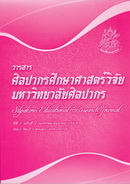การวิเคราะห์ปัจจัยที่สัมพันธ์กับความสำเร็จของการนำนโยบายโรงเรียนมาตรฐานสากลไปปฏิบัติ
Main Article Content
Abstract
บทคัดย่อ
การศึกษาวิจัยนี้มีวัตถุประสงค์เพื่อ 1)วิเคราะห์ปัจจัยที่สัมพันธ์กับความสำเร็จของการนำนโยบายโรงเรียนมาตรฐานสากลไปปฏิบัติ 2) หาข้อเสนอแนะให้กับสถาบันพัฒนาครู คณาจารย์และบุคลากรทางการศึกษา ในการจัดหลักสูตรการฝึกอบรมสำหรับครูและบุคลากรทางการศึกษา เพื่อรองรับนโยบายโรงเรียนมาตรฐานสากล แนวคิดในการวิจัยประกอบด้วยแนวคิดตัวแบบของ Van Meter and Van Horn(1975) และแนวคิดการวัดความสำเร็จของการนำนโยบายไปปฏิบัติของ Berman and Mclaughlin (1977) การดำเนินการวิจัย แบ่งเป็น 1) การศึกษาข้อมูลเชิงปริมาณ กลุ่มตัวอย่างคือสถานศึกษาขั้นพื้นฐาน จำนวน 224 โรงเรียน จากประชากรจำนวน 500 โรงเรียน ที่เข้าร่วมโครงการโรงเรียนมาตรฐานสากล โดยกำหนดขนาดของกลุ่มตัวอย่างตามสูตรของทาโร่ ยามาเน่ ซึ่งได้มาโดยวิธีการสุ่มแบบหลายขั้นตอน ใช้แบบสอบถามเป็นเครื่องมือในการเก็บรวบรวมข้อมูล ผู้ให้ข้อมูล คือ ผู้บริหารสถานศึกษา รวบรวมข้อมูลระหว่างเดือนมิถุนายนถึงเดือนกรกฎาคม พ.ศ.2553 วิเคราะห์ข้อมูลโดยใช้สถิติบรรยาย สัมประสิทธิ์สหสัมพันธ์แบบเพียร์สัน ค่าสัมประสิทธิ์การถดถอยพหุคูณ 2)การศึกษาข้อมูลเชิงคุณภาพ เลือกสถานศึกษา 2 แห่งเป็นกรณีศึกษา ครอบคลุมสถานศึกษาระดับประถมศึกษาและมัธยมศึกษา ใช้แบบสำรวจและแบบสัมภาษณ์เป็นเครื่องมือในการเก็บรวบรวมข้อมูล วิเคราะห์โดยใช้การวิเคราะห์เนื้อหา ลงข้อสรุปแบบอุปนัย
ผลการวิจัยสรุปได้ว่า
1. ความสำเร็จในการนำนโยบายนี้ไปปฏิบัติอยู่ในระดับมาก โดยสถานศึกษาระดับมัธยมศึกษาจะมีความสำเร็จของการนำนโยบายนี้ไปปฏิบัติมากกว่าสถานศึกษาระดับประถมศึกษา
2. ปัจจัยที่สัมพันธ์กับความสำเร็จของการนำนโยบายนี้ไปปฏิบัติ พบว่าตัวแปรต้นทั้งสิ้น 13 ตัว มีตัวแปร 4 ตัวที่มีความสัมพันธ์กับความสำเร็จของการนำนโยบายไปปฏิบัติ โดยมีค่าสัมประสิทธิ์สหสัมพันธ์พหุคูณเท่ากับ 0.639 และตัวแปรทั้ง 4 ตัว สามารถอธิบายความแปรปรวนความสำเร็จของการนำนโยบายไปปฏิบัติ ได้ร้อยละ 40.9 โดยตัวแปรที่สามารถทำนายความสำเร็จฯในมิติรวม อย่างมีนัยสำคัญทางสถิติที่ระดับ 0.05 เรียงตามลำดับความสำคัญดังนี้ 1) สภาพแวดล้อมทางการเมือง 2) ทัศนคติของผู้ปฏิบัติ 3) การติดต่อสื่อสาร และ 4) ทรัพยากรองค์การ
3. หลักสูตรการฝึกอบรมที่ต้องการให้สถาบันพัฒนาครู คณาจารย์และบุคลากรทางการศึกษาจัดอบรม ได้แก่ ทฤษฎีความรู้ การเขียนความเรียงขั้นสูง กิจกรรมโครงงานเพื่อสาธารณประโยชน์ โลกศึกษา และการบริหารด้วยระบบคุณภาพ (Quality System Management)
Abstract
The study aimed at: 1) analyzing the related factors to the success of world-class standard school policy implementation 2) proposing the way to establish the teacher and educational personnel training curriculum for National Institute for development of Teachers, Faculty staffs and educational personnels (NIDTEP) to support the world class standard school policy. The conceptual framework of the research was based on the models of Meter and Van Horn (1975) and of Berman and Mclaugnlin (1977) conducting as the followings: 1) study the quantitative data with the sample of 224 administrators of 224 basic education institutions out of 500 schools that attending the World class standard project. The sample size was determined by Taro Yamane’s table while using the questionnaires as a data collecting tool from the school administrators during June and July 2010 analyzed by descriptive statistics, Pearson’s correlation coefficient, and multiple regression coefficients. 2) study the qualitative data through the two schools from both primary and secondary schools as a case study by collecting data via the questionnaires and interview then analyzing with content analysis, inductive method.
The result showed as the followings:
1. The policy implementation success was at the good level while the secondary school would reach the success level higher than the primary school.
2. As for the related factors to the success of world class standard school policy implementation, there were five out of 13 independent variables influencing the success of policy implementation with the multiple correlation coefficient at 0.639. These 5 variables can also explain the variation 40.9 percentage at the significant level of 0.05. The significant variables consisted of 1) the political environment, 2) the disposition of implementers, 3) the communications, and 4) the organization’s resources.
3. The training courses National Institute for development of Teachers, Faculty staffs and educational personnels (NIDTEP) should conduct are Theory of Knowledge, Extended-Essay, CAS (Creativity, Actions, Service), Global Education, and Quality System Management.

